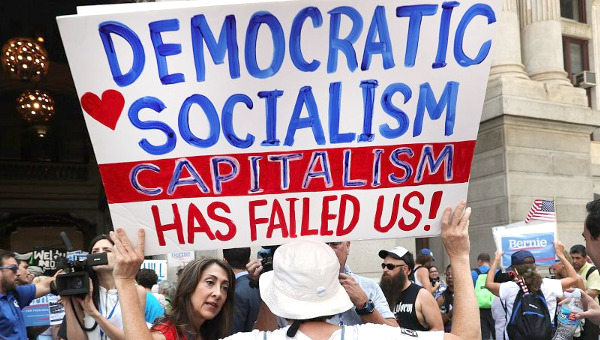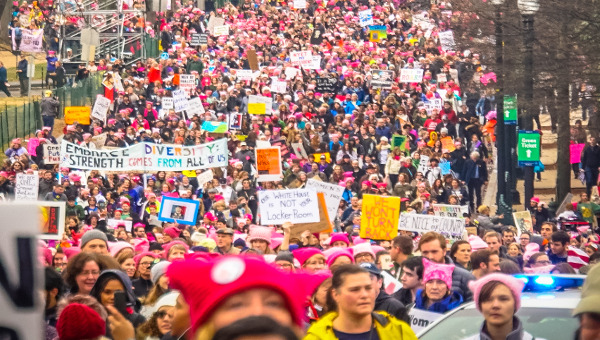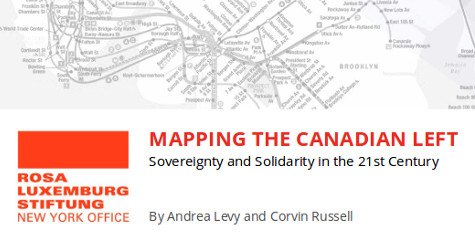Crisis of the State, Crisis of the Left: Articulating Socialism After the Anarchist Moment
The current period in the U.S. remains defined by the 2008 crisis and the economic policies and political forces it set in motion. This has now evolved into a growing crisis between the forms of governance, strategy, and administration that have defined the U.S.-led period of globalization and the state mechanisms of representation, particularly the two dominant parties. Conflicts within the state normally hidden behind the humdrum performance of statecraft have increasingly burst from behind this curtain. Tensions between the military establishment and the intelligence apparatus have been particularly apparent, though these schisms find their origins in the post 9/11 years, if not before. Portions of the intelligence apparatus are openly seeking to isolate or even remove the President, who they evidently see as a threat to the stability of the political order. For his part, after having removed many of the more rabid ‘alt-right’ elements from his administration, Trump has fallen back on extremist military hard-liners as an institutional base of power within the state, and has turned over large portions of the state apparatus to their control. An emboldened military establishment has become politically active to a degree that is rare in U.S. history, even chastizing the President publicly in several instances.
As neoliberal ‘common sense’ was eroded, reflected initially in the Occupy Wall Street movement but reinforced by the spread of the political crisis throughout the state, the legitimacy of mechanisms of representation – centered on the political parties – likewise began to collapse. Both the Republican and Democratic parties are currently in crisis, torn internally between establishment elites seeking to retain control in the face of a mounting challenge from revisionist forces at the base (progressive and alt-right, respectively). While the Republicans seem every day closer to an accommodation with Trump (though it is unclear which side can claim the victory), the Democrats have worked to restrain progressive-populist forces oriented toward class struggle, while hoping to retain some legitimacy outside of the narrow coastal elite that has traditionally identified with the party.
Objectivity and Fake News
Broader components of the ideological system are also in crisis, increasingly unable to organize and impose a hegemonic ‘reality’. The corporate media’s pretensions to ‘objectivity’ have become widely discredited, with charges of ‘fake news’ growing louder from both left and right as well as from an increasingly embattled ‘radical center’ seeking to re-establish neoliberal ‘normalcy’ by marginalizing independent outlets. With a solution to the underlying social crisis provoked by thirty years of neoliberal devastation of working class communities still elusive within the parameters of the established order, these severe tensions are unlikely to be reduced over the long term – even if they are temporarily abated by possible Democratic electoral victories, the likelihood of which is unclear.
While the Republican Party and segments of the military establishment have lurched further to the nationalist hard right in search of legitimacy, the Democrats and the intelligence apparatus have sought to counterbalance this with a renewed assertion of neoliberal cosmopolitanism, anti-racism, and bourgeois feminism. This has led the Democrats further to the right as well. Seeking to re-impose the elite neoliberal consensus upon an increasingly sceptical population – and deprived of conventional hegemonic sources of legitimacy in the media and representative-democratic structures – they have fomented anti-Russian nationalism, including open calls to war, through a broad ideological coalition that incorporates figures from George W. Bush to Bono. This milquetoast ‘resistance’ seeks to project widespread discontent with neoliberalism on to the singular evil of Donald Trump, supposedly an agent of the ‘Russian menace’, along with media on both the left and right that refuse to uphold the self-evident, end-of-history objectivity of neoliberalism. They thus formulate an ‘opposition’ that seeks to restore the basic structures of neoliberal class hegemony – which means avoiding addressing the basic causes of the political crisis, or even offering real alternatives to the Republican platform on issues ranging from economic policy to climate change. Whether this strategy can be successful in narrow electoral terms remains to be seen, but it seems unlikely to resolve the deeper causes of the political crisis over the long run – particularly in the event of another major economic crisis, which is more a matter of when than if.
Clearly, these ‘morbid symptoms’ reflect the crisis of the state rather than the strength of the left, as is apparent from the fact that they have mostly been capitalized on by the right. Meanwhile, the ‘Resistance’ contains barely a hint of anti-capitalism, and essentially appears to be evolving into a get-out-the-vote effort for the Democrats, even as they work to stifle and restrain left forces at their base.
‘Augmenting the left’ – that is, finding ways to build new organizational alliances, expand practices of resistance, and culturally envision and collectively build toward a better world – is therefore not just a worthwhile project, but also an essential one. Human survival may depend upon it. In this regard, it must be recognized that there is also a crisis of the various post-Marxisms, especially to the extent that they tried to replace class as the central structural pivot around which different forms of oppression and counter-hegemonic emancipatory struggles condense. Moreover, the 2008 economic crisis made plain that structurally rooted, systematic crisis is essential to capitalism’s functioning: as Marxists have long held, crisis is not an interruption to a normally-stable equilibrated market, but rather a normal part of the operation of the system. Crises are “the irrational rationalizers of an always unstable capitalism.”1

Post-Marxism had attempted to move beyond what were seen as the limits of Marxism via a critique that combined an awareness of the problems of structuralism with a broader attack on “class essentialism,” whereby economic class was re-envisioned as merely another discursively-constructed identity. Yet this missed the fact that, in liberal capitalism, class is not constituted but rather effaced by the operation of discourse: liberal ideology precisely denies that society is divided into classes at all. Instead, it sees individual rational actors engaged in market exchanges – with the market conceived as a neutral matrix for social interaction. Class, in fact, is a pre-discursive dimension of social ontology. Discourse articulates the life-worlds that are the phenomenological frames through which class is experienced, and within which the meaning of a class situation is determined. Discourse may even attempt to deny class altogether. But the fact of the existence of social classes, determined by ownership and control over the mechanisms and processes that generate social wealth, remains unchanged.
Additionally, collapsing class into a property of discourse also came with another, possibly even larger, price: the abandonment of an analysis of capitalism’s systematic tendencies and pressures. Indeed Post-Marxism seemed to forget, along with liberal ideology, that capitalism is a system with specific drives at all. Though one would not want to revert to vulgar determinist assertions about the fundamental “laws of history,” this threw the baby out with the bathwater. As Wendy Brown wrote,
“capitalism has drives that no discourse can deny … to grow, to reduce input costs, to search out new venues of profit, and to generate new markets, even as the form, practices, and venues for these drives are infinitely diverse and operate discursively.”2
This crisis of post-Marxism is also rooted in the ending of the ‘anarchist moment’ that animated the anti-globalization movement, just as the rise of post-Marxism was itself rooted in the collapse of the Soviet Union and the emphasis on the so-called ‘new social movements’ that some components of the ‘New Left’ expected to fundamentally change the terrain of radical politics. As the limits of the ability of spontaneous mass demonstrations to change the world become clear – while the deadlock of the two-party system remains as formidable as ever – we are now forced to face the question of what comes next. In this sense, both moving beyond the anarchist moment and overcoming the limits of orthodox Marxist party politics requires establishing theoretical foundations for an ‘augmented left’. Here we discover the unity of theory and practice, as what must be constructed is a theory that can serve as a vehicle to organize a left infrastructure that operates from below and derives its democratic potential from mass movements, without ignoring the basic conclusion that democratizing society means transforming the state.
Augmenting the Left
In rejecting these various post-Marxisms, we cannot simply return to Marx. Indeed, post-structuralists have raised very real critiques of Marx and Marxists that must be taken seriously if the project of ‘augmenting the left’ is to have any theoretical substance. These critiques have been wide-ranging, and encompassed a huge variety of issues from many different perspectives. It is impossible to exhaustively catalogue them. However, it is necessary to grapple with some of the dominant themes of this theoretical literature in devising a renewed left. One of the most important of these is the need to move away from declinism, or the idea that ‘capitalism is on its last legs’. Though post-structural theory has sometimes even more radically overstated the fragility of capitalism, and exaggerated the significance of ideological formation, it also supplies some important tools for understanding how dynamic capital can be. This is partly a consequence of the focus on overcoming rigid structuralist models, and questioning the certainty as to the direction of history so often upheld by Marxists. Such theorists have brought out the significance of creative human agency, the importance of consciousness, the uncertainty and volatility of human society and the natural world, and the revolutionary potential of technology to generate new forms of sociality and discipline – and therefore new emancipatory possibilities.
Perhaps even more central to the post-structuralist critique has been the problem of representation, in both the epistemological and political sense. The epistemological gap between the real and its cognitive appropriation has often been elided by Marxists via the claim that capital is a fixed, closed totality whose logical coordinates can be fully apprehended as unchallengeable knowledge. This is based on an often Hegelian closure between knowledge and its object – between the epistemological and the ontological. This erasure of the problem of epistemological representation produces a similar erasure of the problem of political representation: if the logic of the ‘mode of production’ can be fully known, the vanguard party that bears this knowledge need not engage in discussion or debate regarding its ability to ‘represent’ the working class. Rather, it can simply implement the programs that are known to be in the objective best interests of society as a whole (or the working class). In this way, structuralist epistemologies claiming to perfectly represent the real in thought (in the form of abstract functionalist models) have supported strategies that reduce the democratic negotiation of political representation to a matter of ‘scientific’ discovery by knowledge-bearing party leaders. In espousing this ‘idealist Marxism’, reducing reality to the notion, these leaders become priests of historical necessity – responsible for interpreting the Idea. The problem of agency, another focus of post-structuralist critique, is closely related to this. If history unfolds according to a known, determinate ‘logic of capital’, or is conceived in terms of the mechanical interaction of abstract ‘objective structures’, agency can be dismissed as a voluntaristic illusion along with the problems of consciousness more generally.
Important as well has been the focus on challenging supra-economic and supra-class forms of domination and institutional systems of power. Indeed, understanding power and domination in terms of economic class relations alone is clearly insufficient. Even though post-structuralists have often overstated the degree to which such concerns were downplayed or absent in the work of Marxists, there is no question that left theorizations of forms of power and domination that are related, but not reducible, to economic structures have become richer and more nuanced as a result of the important critiques raised by these thinkers. This has also included Foucaultian conceptions of ‘disciplinary power’, which is internalized and reproduced by subjects in an atomized and decentralized fashion. This represents a major contribution to understanding the functioning of power in modern liberal societies supposedly founded upon individual freedom, while posing major dilemmas for left politics. These theorizations demand that emancipation involve more than seizing state power and directing a social transformation; rather, radical politics must reach deeper social realities and everyday practices.
A New Left Project?
With this critique in mind, what is the positive theoretical basis for a new left project? I argue that key foundations from the Marxist tradition can still serve as an essential basis for this project, avoiding the pitfalls posed by the critiques summarized above. First is the idea that the commodity is not a ‘thing’, but rather the fundamental relation of capital – what Marx called “the economic cell form.” Capitalism, as the historical mode of existence of capital amidst other relations and logics, brings the penetration of this relation ever deeper and ever wider into our life-worlds. This therefore brackets questions of cultural difference. Capital, and the commodity form that is its social foundation, is not reducible to a property of any particular culture. Indeed this form has taken hold of and transformed the social relations of ‘Western’ countries just as it has in other places.
Moreover, the basic operation of capitalism lies in the interaction between value and use-value. Capital constantly reorganizes concrete, qualitative reality to serve the infinite production and circulation of abstract value. Qualitative use-values do not matter to capital, only the endless accumulation of quantitative exchange-value. Thus what Marx referred to as a “dialectical inversion”: exchange-value is the only use-value for capital.
In other words, for capital, the only useful things are those produced for the purpose of exchange in pursuit of the endless accumulation of abstract value. The abstract becomes concrete; quality becomes quantity; use becomes exchange; and freedom becomes slavery. Indeed, because the value-form is abstract, this appears to be the result of individual free choice: the threat or use of force is normatively prohibited in the sphere of commodity exchange, which Marx referred to as “the exclusive realm of Freedom, Equality, Property, and Bentham.” The exchange of commodities, including labour-power, appears to be a purely voluntary, individual act.
The coercion that constitutes the foundation of class in capitalism originates elsewhere, in that sphere liberalism explicitly deems “apolitical”: the “private” realm of production. As Marx wrote in characteristically colourful fashion (Capital Vol I):
“we therefore take leave for a time of this noisy sphere, where everything takes place on the surface and in view of all men, and follow them both into the hidden abode of production, on whose threshold there stares us in the face ‘No admittance except on business.’ Here we shall see, not only how capital produces, but how capital is produced. We shall at last force the secret of profit making.”
Workers themselves produce the force – capital – that dominates them; it is none other than their own alienated life energies turned against them. As Marx shows in Capital, capitalism is uniquely a system in which the instruments and conditions of production dominate human beings, rather than serving as an extension of conscious human will and collective social planning. Since investment decisions are based on the need to accumulate abstract value, the ability to produce value for capitalists – rather than meet collective social needs – becomes the primary determinant of the social division of labour, and the ends to which our collective human energies are devoted. Moreover, capitalists themselves do not merely ‘plan’ the economy, but are themselves ruled by the value-form, which enforces its sovereignty via the “coercive laws of competition.” Capitalists must accumulate or perish: “Accumulate! Accumulate! That is Moses and the prophets.” Thus the “law of value” appears over and above conscious human will in shaping social relations and directing society’s productive forces, an objective force that seizes upon human subjectivity and directs it to alien ends – the ends of capital. Capital therefore becomes the subject, while the true subjects (human beings) are instrumentalized as inorganic objects.
Capital must be understood not as a closed totality but rather as a totalizing logic within the relentless totalization in progress that is history. To base our analysis of history on a conceptual totality is to assume, in Althusserian or Hegelian fashion, that we can construct a logical model that fully captures, on the basis of its inner necessity, the actual movement of ‘really-existing’ capitalism. It conflates the logical with the ontological. Though he explicitly criticized Hegel, Althusser’s “structuralism” reproduced a very similar ontology, albeit substituting the abstract coordinates of a ‘structure’ for the Hegelian ‘totality’.
The provisional nature of knowledge, and the process of discovery via proposing hypotheses, is in both cases replaced with absolute certainty about the shape of the Real derived from self-generating abstract theoretical constructs. In both cases, reality is reduced to the notion, and in both cases, the result in political terms is to potentially justify forms of despotism. This is fundamentally at odds with an approach that, understanding subjectivity as rooted in the basic properties of the human organism, sees that the historical ‘totality’ is never complete, but always in a state of becoming, of being made in the concrete life activity of really existing human beings. This leads us to interrogate the Real for its causal interconnections, and to approach human beings as conscious subjects whose capacities for free creative labour are to be emancipated through the revolutionary project. In other words, it points toward a different conception of both epistemological and political representation.
Even though capital is not a closed totality, capitalist social relations exert basic pressures upon conscious human beings, including class struggle, competition (over consumer markets, investment, intellectual property, within firms themselves, and more), tendencies toward concentration and centralization, and systematically recurring crises. But these tell us nothing about the direction of history, or the particular manifestation of these tendencies in different places and times. As conscious subjects, human beings exist in a relation to their situation. This is not to deny that they are conditioned, merely to suggest that they cannot be reduced to their condition. If we are to understand capitalism, we must come to terms with the dynamism with which it has been created and re-created by conscious human beings as a historical process.
It is this moment of subjective human creativity, operative at every ‘level’ and in every ‘sphere’ of social relations, which, at base, is responsible for the dynamism of capitalism. And this is precisely what makes it impossible to study human societies as if they were governed by mechanistic laws. It is only by examining the nature of these projects, constructed within and against specific institutional assemblages that are constantly being remade amidst structural conflicts and synergies, that we can hope to decipher the movement of history. This also means that if capitalism will not simply collapse “on its own”: if it is to be overcome, we must overthrow it.
21st Century Socialism
How, then, are we to connect this theoretical basis for a 21st century socialism to an organized political intervention that is all but absent in North America today? Firstly, one should be clear that the rise of the right in the current conjuncture (sketched out above) is a direct consequence of the weakness of the left. In the absence of an organized radical left, the only force capable of articulating the anxieties stemming from the social dislocations wrought by neoliberal restructuring has been a nationalist and xenophobic right.
Meanwhile, the crisis of neoliberal hegemony has entailed the collapse of post-1990s “Third Way” Social Democratic forces, which moved away from articulating a class-based politics based in universalistic demands for the decommodification of social services and human labour power. Instead, they hitched their wagons to the neoliberal horse, limiting their political horizons to questions of identity and inclusion within a corporate-dominated liberal capitalist order. In fact, since the capacity for labour to oppose Social Democratic parties is limited in the absence of a credible alternative to their left, such parties have served as particularly effective vehicles for pushing neoliberal restructuring (albeit at a slower pace), reinforcing the idea that “There Is No Alternative.” As a result, the legitimacy crisis of neoliberalism has also eroded popular support for even the most well established and deeply rooted Social Democratic parties. Nevertheless, as the emergence of the new left parties in Europe indicates (to say nothing of the meteoric rise of Jeremy Corbyn and Bernie Sanders within traditional parties), although the rise of the right poses significant challenges, the collapse of the neoliberal center also presents an opportunity for the left to present a bold, transformative political vision.
The best way for left forces to regroup – while recognizing the crucial difference between organizing the left and organizing the class – and seriously put a progressive break with neoliberalism on the agenda is to unite fragmented issue-based struggles within a broader socialist vision. Indeed one of the biggest shortcomings of the New Left social movements was their willingness to forsake the goal of broader social transformation in favour of individual issue-based struggles, such as war, the environment, women’s rights, and so on. The task for us now is to find ways to reintegrate these crucial struggles with a longer-term vision for fundamental social change. We must recognize that though important reforms can be won, capitalism is unable to fully accommodate demands for social and ecological justice. Therefore we must go beyond simply opposing neoliberalism.
“The best strategy for confronting the hard right is to destroy the conditions of despair and alienation upon which it feeds by formulating a bold yet credible program for breaking with neoliberalism.”
Similarly lacking in strategic vision is the contemporary ‘anti-fascist’ discourse focused on fighting the hard right. Though many left groupings are now apparently relying primarily on this anti-fascism as a mechanism for building the left, simply opposing the far-right leaves us de facto defending neoliberalism unless we can come up with a positive program to collectively build toward something else. The best strategy for confronting the hard right is to destroy the conditions of despair and alienation upon which it feeds by formulating a bold yet credible program for breaking with neoliberalism and building toward a brighter future. This must not simply write off, but speak directly to the concerns and anxieties of those who have thus far found voice only in the chauvinist nationalism of the hard right. It must work to identify and pragmatically confront the forces responsible for the devastation of working class communities in recent decades. The intensifying ecological crisis makes this all the more urgent.
The basic principles that must animate a contemporary left program are clear enough. These include changes in the organization of our communities, including de-commodification of social services and developing ‘green’ ways of living, working and playing. It also involves reinvigorating workplace organizing, and building the democratic and activist capacities of the labour movement in conjunction with social movements and community activists, including through such campaigns as the Fight For $15 and $15 and Fairness in Canada. But the neoliberal restructuring of the state and the economy, including the decline of state fiscal capacity and the global restructuring of accumulation, are such that neither unionization nor social movement activism alone are capable of bringing the broader political changes that are essential to rebuilding the power of the working class. Given the neoliberal restructuring of production, even implementing relatively mild reforms by historical standards today requires a radical confrontation with capital. The old question of “reform versus revolution” is ever less relevant. The more pertinent issue is whether we can implement reforms that are robust enough to withstand the pressures of capital’s totalizing logic, which have intensified over the neoliberal period.
An augmented left, from this perspective, could take the form of what Greg Albo has called “a political ecology of movements and forces” working toward another world, and supporting a struggle on the terrain of the state to transform it and move toward a genuinely democratic society. This requires building a political infrastructure that can reproduce and amplify popular power, animated by principles of class struggle and mutual solidarity and seeking to construct democratic systems of production and distribution for use rather than exchange. It means overcoming alienating commodity relations with organic human bonds founded upon mutual respect and solidarity. And it means facilitating the production of new, class subjectivities that can support these efforts, and serve as the gateway to a society in which collective human flourishing is truly possible. •






